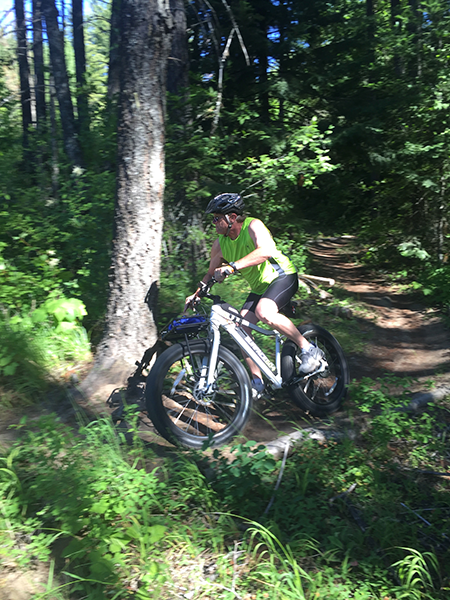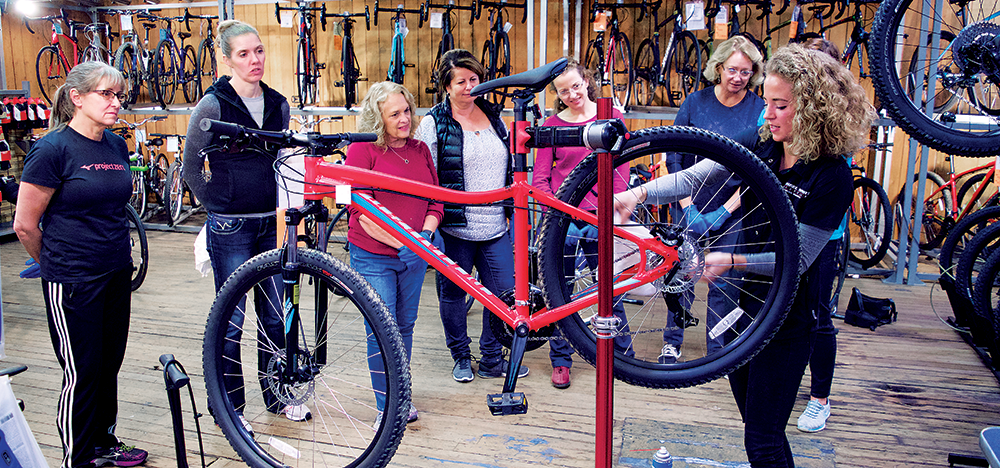Wednesday Night Mountain Bike Races at Riverside State Park Begin (May 2-end of June)
Meet at the old airstrip in the 7 Mile area of Riverside State Park Wednesday nights beginning May 2 and continuing every Wednesday through the end of June. There will be a different course each week suitable for all experience levels. Cost is $20 per race for those 18 and older; 17 and younger are paid by various sponsors. Info: Nomadzracing.com/races.html. (Sarah Hauge)
E-Bike Industry Takes Off
Electric bike sales in the U.S. nearly doubled in 2017, with a 91% industry growth rate. They are popping up everywhere is seems: at bike demo events, on streets and trails, and at your local bike shops. Despite their exploding popularity, most riders and the general public know little about the technology that’s out there and where the bikes can be ridden.
When most people talk about electric bikes or e-bikes, they are referring to commuter bikes, cruisers, or mountain bikes that pedal just like a normal bike but that have an electric motor assist that kicks in either while pedaling or with a throttle lever or button. Most e-bikes can be adjusted to offer more or less of an assist and some can be set so that the assist stops after the bike reaches 20 mph. Most electric-assist bikes get between 20-50 miles on a single 3-6 hour charge, but some models can go much farther. Other classifications of electric bikes don’t require you to pedal and can boost bike speed beyond 20 mph. These models are more likely to have their use limited on trails as e-bikes become more heavily regulated but may be a great option for commuters riding on roads.
The advantages of e-bikes, which have been popular in many European countries for years, are many. Commuters can ditch their cars to make longer trips to and from work and tackle hills that they might not otherwise take on as often with a traditional bike. Older riders and people with disabilities are also able to ride farther on roads and trails that might otherwise be too difficult. Other riders are attracted to the thrill of the silent pedal-assist electric boost.
Meanwhile, land managers and state and federal agencies are doing their best to keep up with the growing e-bike use on public roads and trails. The Washington and Idaho state legislatures both recently passed legislation defining different classifications of e-bikes which should make it easier for public land managers to update their policies covering which classifications of e-bikes are allowed on different types of trails, from paved pathways to more primitive gravel or dirt trails. Right now, there is a bit of a gray area on where you can ride electric-assist bikes, but they are currently treated like traditional bikes with the same rules on trails managed by Washington State Parks and the City of Spokane.
The rules in Idaho, however, are less clear at the moment while land managers determine how to adapt to new legislation. The Empire Trails near Spirit Lake, Idaho, on the other hand, is a mountain biking trail system on private Inland Empire Paper Co. land that is completely open to e-bikes. At the federal level, the U.S. Forest Service and BLM treat all e-bikes as motorized vehicles that are not allowed on forest service or BLM non-motorized trails that might otherwise be open to bikes; however, Forest Service trails open to dirt bikes are open for e-bikes. Riding on roads, where e-bikes may greatly increase the number of bicycle commuters, is legal everywhere as long as riders follow the rules of the road. (Derrick Knowles)

Memorial Day Bike Tour with Wheel Sport (May 27-28)
This overnight bike trip, called the “Bar-Brew Cruise,” is set for Sunday and Monday of Memorial Day weekend will depart from Wheel Sport’s South Hill location, ride from there down to the Centennial Trail, which they’ll follow into Idaho before taking U.S.-95 up to Farragut State Park for a night of camping. The cost is $20 and includes the camping fee, barbecue, beverages, and breakfast burritos. The group, which will be capped at 50, will ride back to Spokane together on Monday. The route is about 60 miles each way. Participants are responsible for providing their own camping gear, and transporting it if possible. If interested, contact Annika LaVoie at Wheel Sport’s South Hill store: (509) 326-3977. (Sarah Hauge)
Race Season Underway for Washington Student Cycling League
Designed for riders in grades 6-12, this mountain bike program, organized by the Washington Student Cycling League, offers a holistic mountain bike experience to students across Washington. The program’s aims include promoting youth development, leadership, confidence, health, and public stewardship, and lifelong cycling enjoyment. Registration cut off in April—but if you’re in the area, cheer on the races, held April 22 (Gig Harbor), May 6 (Joint Base Lewis-McChord), and May 20 (location TBA), with state championships held June 3 in Wenatchee—and plan now to register interested students for next year. Details at Washingtonleague.org. (Sarah Hauge)
New Name for the John Wayne Trail?
Although it’s technically one trail, the Iron Horse State Park Trail is also commonly called the John Wayne Pioneer Trail. Adding to the mix-up, this 212-mile cross-state rail trail is part of a network of trails that include the Columbia Plateau Trail, Fish Lake Trail, and, eventually, the Spokane Centennial Trail. Washington State Parks is introducing a plan to rename the trail, erase any perplexity, and connect it to the region with geographical or geological references. “Determining one name for the trail will help eliminate confusion,” says Randy Kline, Statewide Trails Coordinator. “Also, giving the trail one meaningful name will highlight its significance as one of the longest cross-state trails in the country.”
The John Wayne/Iron Horse State Park Trail, which requires a free permit for the section east of the Columbia River, runs from west of North Bend to the Columbia River near Vantage, and continues from the town of Lind all the way to the Idaho border, crossing the Columbia Plateau Trail along the way. Trailheads and access points are located at multiple locations along the trail, and camping and other lodging is available regularly along the route. The trail crosses several sections of private land and closed or missing trestles, requiring permission to cross or detours on nearby roads at multiple locations (visit Friendsofjohnwaynepioneertrail.org to learn more or plan a trip).
The Iron Horse State Park Trail is an outlier. As consistently as possible, State Parks’ policy for naming trails gives preference to trail names based on geographic locations, culturally significant history, events and places, geologic features, or relevant botanic or biological references. Since it is an old railroad line, there’s nothing wrong with the Iron Horse name. However, the agency believes they can do better, and they’re seeking public comment.
Some of the proposed names include: Cross Washington State Park Trail (descriptive trail name), Milwaukee Road State Park Trail (name of the railroad that operated on the trail), Palouse to Cascades State Park Trail (geographic description of the trail route), and, the most popular so far, Cascalouse State Park Trail (a contraction of the Cascade and Palouse geographic areas).
The deadline for comments is Friday, May 4. Visit Parks.state.wa.us/1099/Iron-Horse-Trail-Renaming-Effort if you would like to contribute to the naming. Following the public comment period, State Parks staff will present recommendations to the parks commission for consideration at its next meeting in Spokane on May 17. (Jon Jonckers)
Women’s Bike Maintenance Class
Held twice each month at Wheel Sport’s South Hill location, this free class, limited to 10 women per session, is a hands-on opportunity to learn bike maintenance. Bring your own bike. Class instructor Annika LaVoie covers important basics like how to clean and lube a bike chain and how to change a rear flat tire. “It’s always a good time. It’s just a really empowering way for the ladies to take charge of their own maintenance,” says LaVoie. “It’s open to all. That is my goal—to get more gals on bikes.” To check upcoming dates and sign up, call Wheel Sport’s South Hill store: 509-326-3977. (Sarah Hauge)

State Supreme Court Decision on Recreational Immunity
The Washington State Supreme Court unanimously found in favor of Pierce County in the Lockner vs. Pierce County case regarding whether Pierce County was covered by the State’s recreational immunity statute when a cyclist was injured on the Foothills Trails.
According to the court documents, “Lockner and her niece were riding their bicycles on the Foothills Trail in Pierce County. Lockner was riding behind her niece as they approached a riding lawn mower from the rear. The lawn mower, operated by a Pierce County Parks and Recreation employee, was mowing grass on the right side of the trail, moving in the same direction as Lockner and her niece. Lockner’s niece rode past the lawn mower, and Lockner followed, attempting to pass with the lawn mower on her right. Lockner raised her left hand from the handle bars to shield her eyes from debris in the air from the lawn mower. She tried to veer to the left to get off the trail and clipped her niece’s bike.
Lockner filed a negligence suit against the county and its employee, the lawn mower operator. The county moved for summary judgment, arguing that recreational immunity precluded the claim. The trial court granted the county’s motion. Lockner appealed. The Court of Appeals reversed summary judgment, concluding that pursuant to a previous case, recreational use immunity could not be determined as a matter of law because there was a disputed issue of material fact as to whether the trail was open “solely” for recreational use.
Does recreational immunity apply to the premises or the activity? If you’re willing to peel the onion layers of this court case, it all comes down to one truth, a trail’s use is equally transportation AND recreation. Thankfully, the statewide immunity was put into place to encourage landowners to allow public use of their land for outdoor recreation by providing the landowners with immunity from most injuries that might be sustained through the public’s use.
This is a major victory for public trails and community paths in Washington State, and it will certainly be a cornerstone case for any litigation involving urban community trails in the Northwest. (Jon Jonckers)
25th Annual Lilac Century Bike Ride Offering Family-Friendly Routes (May 20)
Five tour lengths (100, 66, 50, 22, and 15) for Spokane’s Lilac Century mean this event is friendly for bikers at all experience levels. Two race lengths (15 and 22 miles) have been designed specifically to accommodate families with young kids by following the Fish Lake Trail from the foot of Sunset Hill out toward Scribner Road and back. The 15-mile course avoids road traffic entirely (the 22-mile ride follows the same route, with the addition of a 3.2-mile section from SFCC along Government Way). There will be a baked potato feed for all at the finish. Proceeds benefit local charities supported by the Spokane Aurora Northwest Rotary Club. Details at Lilaccentury.com. (Sarah Hauge)
Coeur d’Alene Enduro (July 7-8)
The inaugural event at Canfield Mountain is a two-day, camp-style mountain bike race on Coeur d’Alene’s local trail system. The CDA Enduro is the Inland Northwest’s newest addition to the popular enduro race scene. Canfield Mountain is easily accessible from the heart of town, but the trails themselves have the feel of a backcountry adventure. Racers will camp near the trailhead for two full days of racing on rowdy single track (including one never-ridden, completely blind stage). Race festivities include a bonfire, beverages, a dinner for the racers, and other surprises. Cdaenduro.com. (OTM) //
Feature photo: Robert Yates













